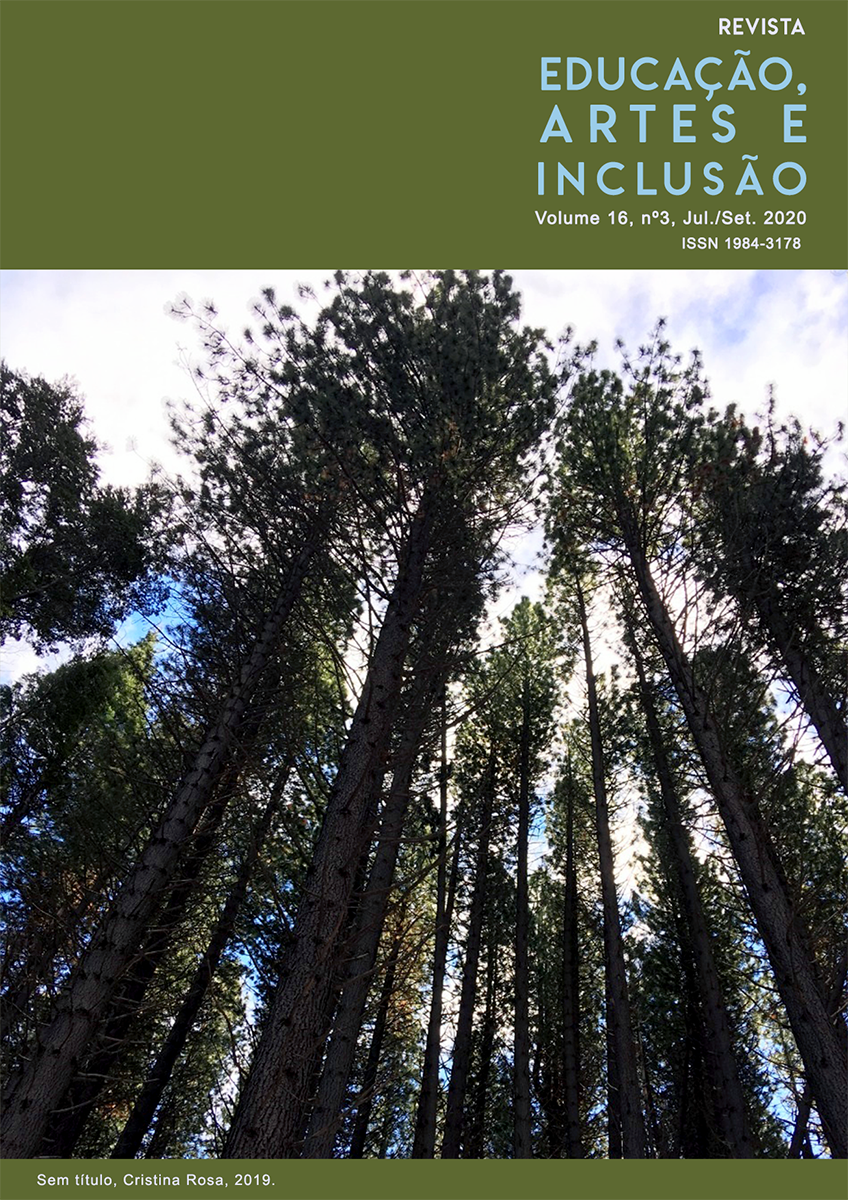Contribuição da cultura afro-americana à filosofia
DOI:
https://doi.org/10.5965/198431781632020010Keywords:
Jazz, Ontologia da arte, Tradição, Criação, Participação,Abstract
As músicas provenientes do campo jazzístico contagiaram a cultura mundial. Contudo, de forma excepcional, a cultura afro-americana se construiu do ponto de vista da história dos vencidos. Essa “apoteose dos vencidos” requer uma reconsideração de nossa ontologia da arte. De fato, o autor das músicas do campo jazzístico desaparece em benefício da tradição e a invenção se articula sobre a imitação. Mas, por meio da invocação (tropo) da “chamada e resposta”, o indivíduo se encontra absorvido no coletivo: é a fronteira entre criação e contemplação que parece perder sua pertinência. Todavia, por trás deste questionamento da ontologia da arte, existe toda a dialética sujeito/objeto através da qual se articula uma filosofia ocidental. Certamente, não se trata mais de um sujeito que cria (autor) ou que contempla (espectador) uma obra. A obra como um objeto colocado face à consciência de um sujeito se reabsorve em um momento participativo, a consciência não é mais consciência de, nem consciência para alguma coisa, mas consciência com um mundo que se constrói.
Downloads
References
ARISTOTE. La Politique. Trad. J. Tricot. Paris: J. Vrin, 1970. (Texto estabelecido por Becker: Politique,III, 5, 1278a, 20).
BENJAMIN, Walter. Sur le programme de la philosophie qui vient. In: _. Oeuvres I, Trad. Maurice de Gandillac, par Rainer Rochlitz et Pierre Rusch. Paris: Gallimard/Folio, 2000.
BENJAMIN, Walter. Thèses sur le concept d’histoire. In: _. Oeuvres III. Traduction Maurice de Gandillac revue par Rainer Rochlitz et Pierre Rusch. Paris: Gallimard/Folio, 2000.
BENJAMIN, Walter. Paris capitale du XIX siècle. Traduction Jean Lacoste. Paris: Cerf, 1989.
BÉTHUNE, Christian. L’apothéose des vaincus. Toulouse: Presse Universitaire du Midi, 2019.
BOISSIÈRE, Anne. Chanter, Narrer Danser, Contribution à une philosophie du sentir. Sampzon: Editions Delatour, 2016.
BOULEZ, Pierre. Penser la musique aujourd’hui. Mayence: Gonthier/Médiation. 1963.
BROWN, Cecil. Stagolee Shot Billy. Cambridge: Harvard University Press, 2003.
COHEN-AVENEL, Pascale. Si on a du jazz pas besoin de schnaps: jazz négritude et démocratie sous la république de Weimar. Frankfurt am Main: Peter Lang, 2011.
DOUGLASS, Frederic. Life and time of Frederick Douglass Written by Himself. Boston: De Wolfe & Fiske, 1892.
EPSTEIN, Dena. Sinful Tunes and Spirituals: Black Folk Music to the Civil War. Urbana, Chicago: University of Illinois Pres, 2003.
HARTMAN, Saidiya. Scenes of Subjection. New York: Oxford Univesity Press, 1997.
JACKSON, Bruce. Wake up Dead Man. Georgia: University of Georgia Press, 1999.
JONES, Leroi. Blues people. New York: Melrose Music Corp, 1963.
LASSAUZET, Benjamin. L’humour chez Claude Debussy. Paris: Hermann, 2019.
ROACH, Max. Jazz Magazine. Fontainebleau. n° 238, nov. 1975, p.20-21.
ROACH, Max. Jazz Magazine. Fontainebleau. n°435, mar. 1994, p. 16.
MELLON, James. Paroles d’esclaves: Les jours du fouet. Trad. Helaina Pisar avec la collaboration de Sarah et Denis Baldwin-Beneich. Paris: Seuil, 1991.
REDIKER, Marcus. The Slave Ship: A Human History. New York: Penguin Books, 2007.
SOUTHERN, Eileen. Histoire de la musique Noire américaine. Trad. Claude Yelnik, Paris: Buchet Chastel, 1976.
STRAUS, Erwin. Les formes du spatial, leur signification pour la motricité et la perception. Traduction Michèle Gennart. In: Jean-François Courtine (Org.) Figures de la subjectivité: approches phénoménologiques et psychiatriques. Paris: C.N.R.S, 1992, p. 15-49.
THOMPSON, Katarina Dyone. Ring Shout, Wheel about: The racial politics of music and dance in North American Slavery, Chicago: University of Illinois Press, 2014.
WHITE, Shane; WHITE, Graham. The Sound of Slavery. Boston: Beacon Press, 2005.
Downloads
Published
How to Cite
Issue
Section
License
Copyright Statement
The Educação, Artes e Inclusão is a journal that follows the Free Access Policy. The articles published by the journal are free of charge, intended for educational and non-commercial applications. The articles whose authors are identified represent the expression from the point of view of their authors and not the official position of the Educação, Artes e Inclusão Journal or the Educação, Artes e Inclusão Research Group.
Authors who publish in this journal agree to the following terms:
(A) Authors retain the copyright and grant the journal the right of first publication, with the work simultaneously licensed under the Creative Commons Attribution License which allows the sharing of the work with acknowledgment of authorship and initial publication in this magazine.
(B) Authors are authorized to take additional contracts separately, for non-exclusive distribution of the version of the work published in this journal (eg publish in institutional repository or as a book chapter), with acknowledgment of authorship and initial publication in this magazine.
(C) This journal provides public access to all of its content, as this allows for greater visibility and scope of published articles and reviews. For more information on this approach, visit the Public Knowledge Project.
This journal is licensed under a Creative Commons Attribution-NonCommercial-ShareAlike 4.0 International License. This license allows others to remix, adapt and create from your work for non-commercial purposes, and although new work must give you due credit and cannot be used for business purposes, users do not have to license such derivative works under the same terms.



